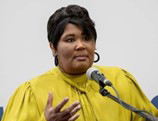In the shadowy corridors of global crime-fighting, where swift decisions and unwavering resolve dictate the safety of nations, the often-overlooked presence of women in policing emerges not merely as a symbol of inclusion but as a driving force behind a new era of intelligence, empathy and operational excellence.
This article explores the essential role of women in police architecture across the SADC region, the African continent and within Interpol, highlighting their contributions to international policing and peacekeeping missions.
In the SADC region, the establishment of networks such as the SADC Gender Unit and various women’s networks in police forces highlights a commitment to enforcing gender equality and effective law enforcement.
Initiatives like operations ‘Basadi’, which means ‘women’ in SeSotho and SeTswana languages, are operations by female police officers across countries in the SADC region, and they focus on combating priority crimes, particularly those perpetrated against women and children, such as defilement, rape, assault, human trafficking, domestic violence, and child labour, among others.
Notable: Women in SADC police operations have led to training programmes focused on gender-based violence and child protection, essential in a region where these issues are prevalent.
Through outreach programmes, workshops and public awareness campaigns, they have fostered strong relationships between law enforcement agents and the community members, encouraging proactive crime prevention efforts.
In African architecture, women have also made significant strides in peacekeeping missions, serving as contingent leaders and playing key roles in maintaining stability and security.
Their involvement extends beyond traditional roles, as women contribute to strategic planning, negotiations and conflict resolution.
It is evident that women often serve as mediators and negotiators in conflict resolution processes. Their involvement in peace talks and reconciliation efforts helps bridge divides and foster inclusive solutions.
It is also worth acknowledging that women often lead or participate in local initiatives aimed at reducing crime, such as neighbourhood watch programmes, youth engagement activities, and anti-violence campaigns.
Their involvement helps build safer communities and empowers local populations to take proactive measures against crime.
The role of women within Interpol reflects broader societal changes while shaping operational dynamics and strategic outcomes.
Women in Interpol have significantly contributed to the organisation’s mission, particularly in addressing cross-border crimes such as human trafficking, cybercrime, and drug smuggling – issues that disproportionately affect women and children.
Female police officers bring a deeper understanding of gender-based violence and exploitation, leading to more empathetic and effective victim-centred approaches. For instance, women in Interpol have led specialised training programmes focused on gender-based violence, improving investigative techniques, and the protection of victims across member states.
They have also made substantial contributions to cyber-crime units, providing innovative solutions that combine technological expertise with critical interpersonal skills.
Women-led initiatives in cyber-crime operations have successfully dismantled networks involved in online sexual exploitation.
The role of women in these police architectures – whether within Interpol, SADC or African peacekeeping missions – is not merely symbolic but represents a transformative shift towards more inclusive and effective security operations.
As cyber-crime continues to evolve, women in leadership roles, such as cyber analysts and investigators, provide innovative solutions that integrate technological expertise with interpersonal skills crucial in collaborative international operations.
Women’s diverse perspectives enrich decision-making processes and operational strategies, ensuring that policing and peacekeeping efforts address a broader range of issues with greater sensitivity and effectiveness.
Women continue to challenge traditional paradigms and drive innovations in global security and law enforcement.
As this transformation unfolds, the role of women will not just be remembered as a critical turning point in history but as the driving force that continues to propel policing architectures into a future where diverse leadership is respected and essential for global security. *Anne-Marie Nainda writes in her capacity. Her views do not necessarily reflect those of any police architecture.


